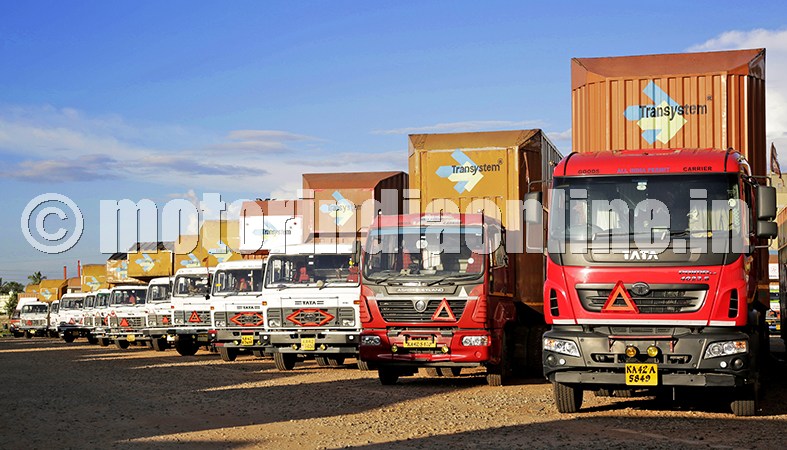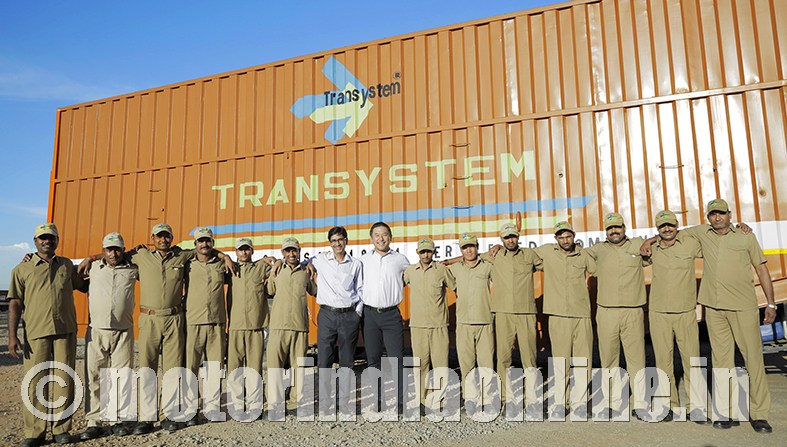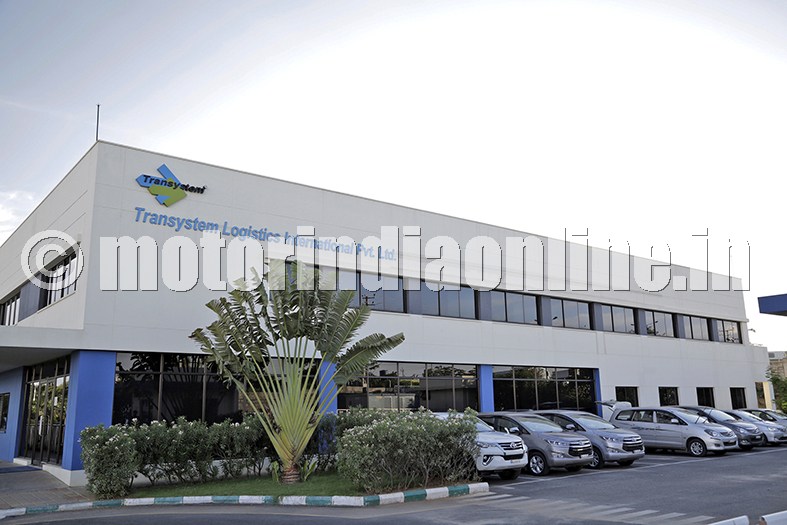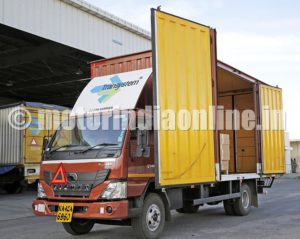Every morning, the ever-present group of drivers in the parking yard of Transystem Logistics International (TLI), waiting for carrying away loads for delivery, are greeted ‘Namaskar’ in the low deep bass tones of Mr. Masaki Shimomura. The drivers have not, as yet, learnt to greet the Managing Director in his native Japanese. They are simply happy that their boss is speaking their language. Bringing in the humaneness in every action of his has brought Mr. Shimomura closer to not only TLI’s drivers but the employees as well.
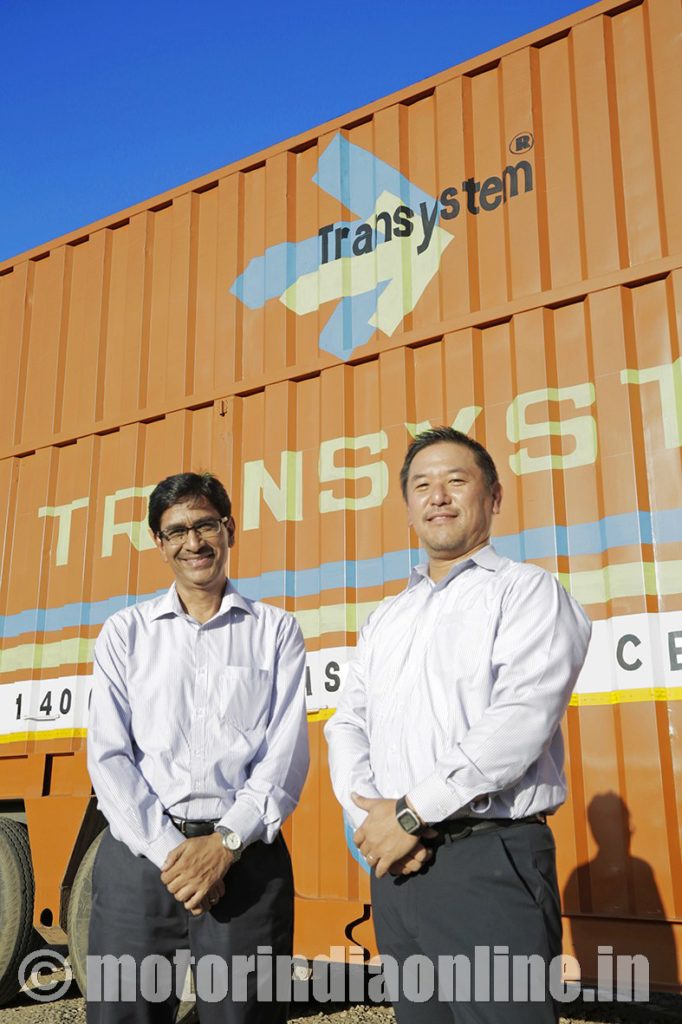
The TLI plant in Bidadi Industrial Area in Ramanagara district of Karnataka under a beautiful blue sky dotted with puffy white clouds was pleasant. After a traditional namaskar with folded hands and an enthusiastic ‘Arigato’ meaning ‘thank you’ from us, we are joined by Mr. Sagar Agarwal, Senior VP – Finance & Administration.
TLI, as is widely known, is born out of two auto giants, TCI, India and Mitsui, Japan, owning 49:51 respective stakes. It is a one-stop logistics shop offering in-bound logistics services to Japanese brands of Automobiles in India, including warehousing service, and container logistics and also out-bound logistics services for CBU and aftersales spareparts.
We learn that Mr. Shimomura is a vociferous advocate of safety– whether of his drivers on the roads, or of his employees in the premises remaining accident-free by not walking while using their smart phones. His other priorities are ‘Keep Smiling’ and ‘Clean Environs’ – both inside and outside of TLI grounds. In the last two-and-a-half years of his heading TLI here, he has drummed these messages into his Team TLI, including the drivers.
With an owned fleet of 300 carriers and another 1,500 hired on contract, TLI has around 600 drivers for their own fleet.
Mr. Shimomura says: “We follow ‘Safety First Quality Must’. We have our own maintenance shop to perform periodical preventive maintenance. That is why the number of breakdowns has reduced dramatically. The mindset for quality has changed due to this and, in turn, our operational quality has improved. In the last two-and-a-half years, the accident rate has fallen by 75 per cent.”
Mr. Agarwal says: “In our industry, change of mindset is crucial. Respecting the drivers and the supervisors is important. Technology wise, we have real time GPS, monitoring system and that’s how we call our driver and warn him to avoid potential accidents. We also offer sleeping, bathing and eating facilities for drivers on our premises while they wait during loading. Giving respect makes a difference.”
In their words, accident to human beings is unacceptable.
JIT – Epitome of Efficiency
TLI lives by Just In Time (JIT) delivery. Both Mr. Shimomura and Mr. Agarwal keenly explain how it is interpreted by TLI and other logistics companies where a huge chasm exists in its definition and implementation.
Mr. Shimomura comments: “We introduced JIT in India. Based on the production plan we develop logistics plan every month. As logistics partner we do have buffer, but we have been doing this for long, so we know how to manage unexpected situations.”
Mr. Agarwal observes: “Some companies have warehouses near their plant and they deliver as per the plant requirement. They call it JIT. But we do so from the supplier to the plant which is real JIT delivery. It involves a combined effort of the OE, the supplier and the logistics partner and it is working successfully for the last 17 years.”
Synergy – Key to Success
Following the Japanese philosophies of business and growth, TLI believes in concepts like Heijunka and Muda, meaning levelling and no wastage, respectively. Heijunka helps TLI meet demand by balancing predictability with flexibility and stability.
Mr. Agarwal says: “The logistics sector suffers from an inefficient system. There are not many auto OEs, and major logistics partners in India. Yet there is no synergy between them, though it is possible. For example, a transporter builds in the idling cost of his vehicle into the cost … but think, if the idling is avoided because there is synergy with the OEs, then cost is real and efficiency is better.”
No wonder that the logistics cost in India stands at around 13 per cent while abroad it hovers between 7-8 per cent.
One Nation = One Tax
With the Central Government rolling out the much-awaited GST in July 2017 and actively improving infrastructure, the industry is looking forward to a positive change in operations.
Mr. Shimomura is happy that with GST, transportation time and stress in general in the system will be less, besides realising his heart-felt desire – change of mindset of all stakeholders. He expects the Indian auto industry to grow by about 7 – 10 per cent from about three million last year.
Mr. Agarwal adds: “If the reverse charge mechanism is decided upon in GST for road transportation, we will not get any input tax credit which is applicable to other modes of transportation like rail, sea and air. This will increase the input cost for road transportation, however, improved operational efficiency on the road will be the main benefit. One advantage due to forthcoming e-way bill will be that if your vehicle is stopped by an official for more than half an hour, then you can upload the same point on to the GSTN portal and the officer will need to clarify the hold up.”
Both Mr. Shimomura and Mr. Agarwal are confident that GST will work to the benefit of the industry with the added advantage of drastic minimization of manual intervention, even though it will take around six months for the road to get smoothened. Another advantage that is foreseen is the coming up of centralized warehousing and distribution system phasing out isolated and small warehouses and the related hub and spoke systems. As Mr. Shimomura says it is only natural because companies will think about ways to reduce the logistics cost by improving operations.
Body of Innovation
TLI is poised to bring in the steel-mesh woven fabric body instead of the steel body for carriers. According to it, not only will the steel fabric reduce the weight of the carrier but will also be more adaptable to the increasing car sizes by manufacturers.
Mr. Shimomura comments: “We will begin with prototypes and then introduce more based on successful operation. Though the technology is European it will be fabricated in India.”
Mr. Agarwal remarks: “Though all our inbound trucks are made of steel and have side-open doors, with fabric sides the forklift can just slide in the load with more efficiency and in less time. We believe that the safety risk will not be much by way of theft even with the steel-mesh fabric sides.”
Financial Forecast
Mr. Shimomura is of the firm the belief that the market situation is healing after the initial negative impact of demonetization. “The Indian automotive logistics market is growing by, say, 10 per cent more than last year. For us it is possible to capture another 10-15 per cent growth. I believe technology-driven logistical solutions are in the offing which will help the market in observing the fluctuation in demand. This will probably result in partial phasing out of independent small players in the near future because of IT requirements.”
The Indian automotive logistics market where roughly 70 per cent of the transportation happens by road leaving five and 25 per cent in the hands of coastal and rail respectively is poised for consolidation. A definite transformation of the market is in offing and Transystem Logistics is ready with a promise of smooth transition.
